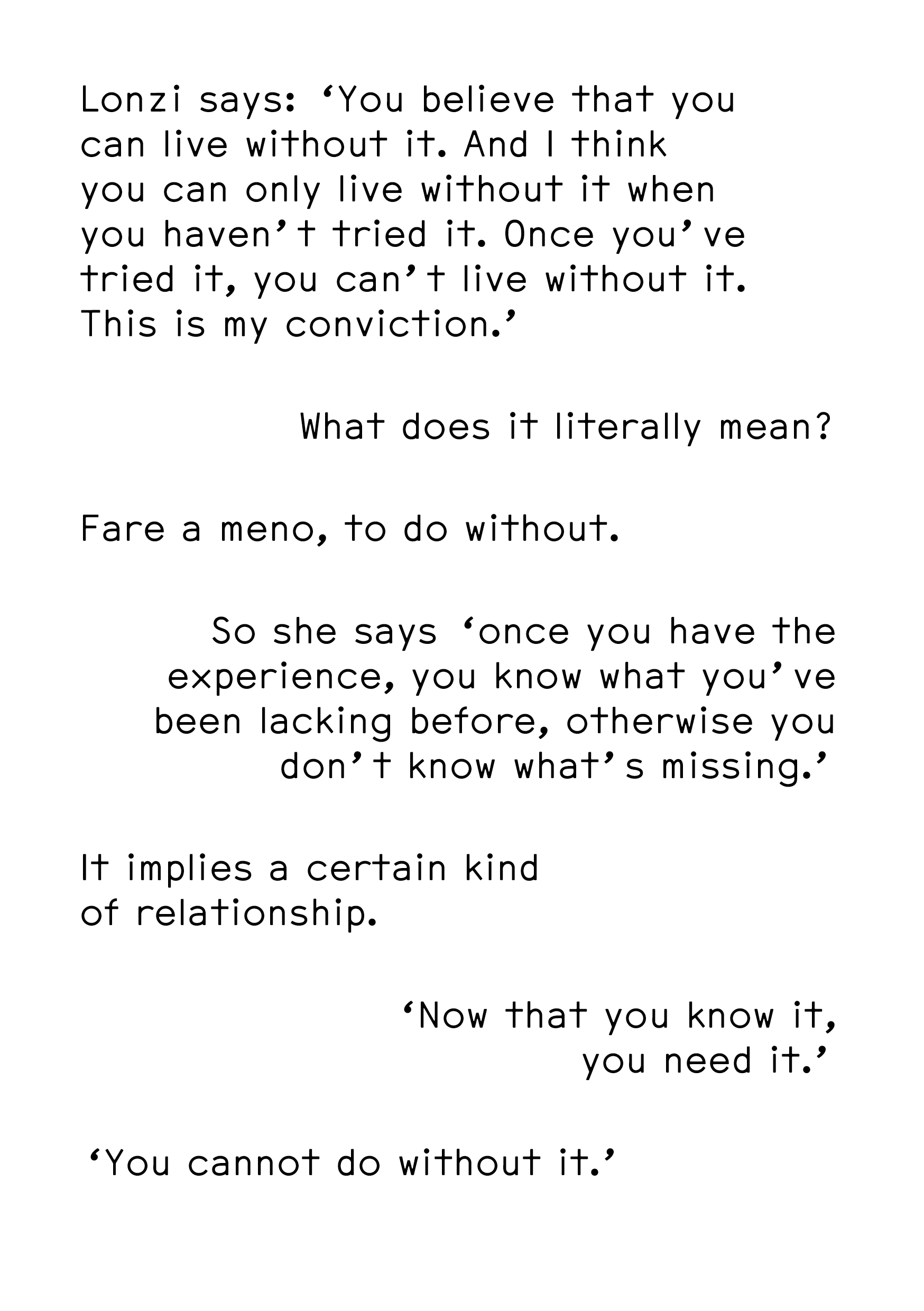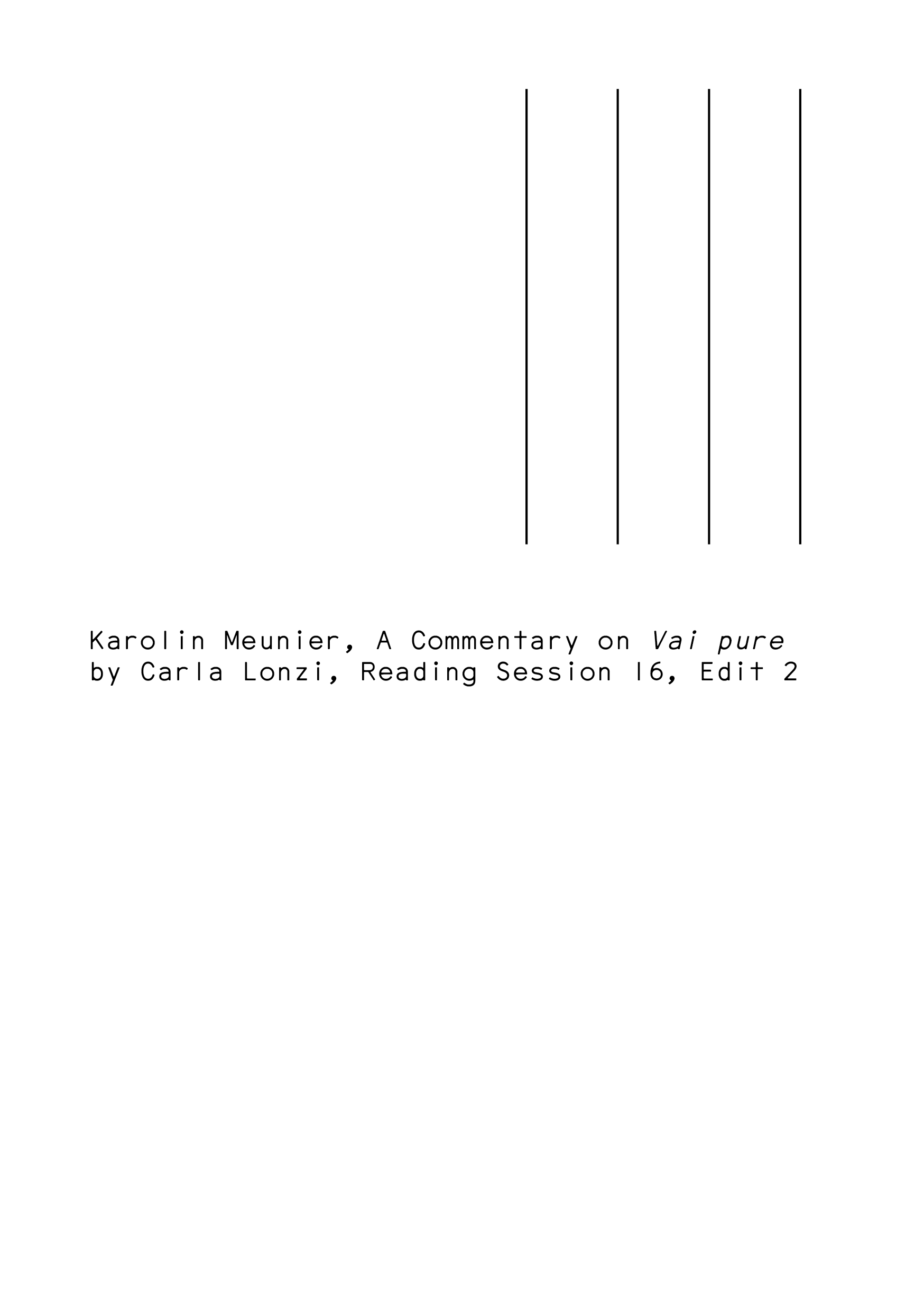Contributions
You Can’t Do Without


‘Without’ is a tricky word: whatever subject comes after it will find itself excluded before it is even said. Someone doesn’t appear, something doesn’t happen, but also: nothing comes up to stand in the way. It defines a lack, an absence in relation to a supposed presence and availability. Its use may give reason to object (against marginalization) or to feel liberated (from constraints). The word describes the complicated relationship of having and not having, of taking part and remaining invisible, a situation where something is yet to gain or still to get rid of.
In the multi-faceted trajectory of feminist practices and struggles, the dichotomy between ‘with’ or ‘without,’ between the presence and the absence of someone or something, has always been a contested subject. Who defines whether something is missing, how a body is perceived, or under which circumstances someone goes public with their experience?
The double negation of ‘you can’t do without’ is a figure that emerged in one of the conversations I initiated around Italian feminist and writer Carla Lonzi. Here I want to use it as one possible angle to introduce my approach on reading Vai pure (‘You Can Go’), a dialogue between Lonzi and her partner, the artist Pietro Consagra. The original text was published by Lonzi in Milan in 1980 and has not yet been translated into other languages. Considering that I do not speak Italian, I have to rely on others who do and who explain to me the content of the book in a language I am more familiar with, English. I go through the dialogue with different people and invite them to bring in their own knowledge and opinions about the author, context, and content of the book, as well as their own take on the two languages. I record, transcribe and edit our discussions, not aiming for a final version.
In many passages of both the text and our conversations, the gesture of withdrawal and the need for acknowledgment are a constant matter of reevaluation. Lonzi repeatedly articulates her reluctance towards the promise of women gaining greater visibility in a male-dominated society and asserts that it is a laborious process to understand and undo the very conditions that set the frame for recognition.
Fare a meno, ‘to do without,’ came up in a conversation with Chiara Figone. In the passage we read and translated, Lonzi describes to Consagra her urgent need for dialogue in relationships, be it to him or the feminist group. It’s like breathing, she says, and that once you know how things can be different, you can’t live without it – she doesn’t really specify what ‘it’ is referring to. Chiara adds, It’s the same with a good mattress: once you tried it, you don’t want to sleep without one. ‘Not without’ is not the same as ‘with,’ the former reminds you about the flipside of the latter. Here, the expression demonstrates that the right conditions for breathing, sleeping and being in dialogue can never be taken for granted, are always up for negotiation.
With this in mind, I want to end with a quote from a reading session I had with Luisa Lorenza Corna. It refers to the first sentences of the second chapter of Vai pure.
Luisa: [Reads silently] I remember this passage well. It’s quite significant, I think, because Lonzi talks about this looking, cercare …
Karolin: Looking, for what?
Luisa: ‘Looking without an end’ or ‘my looking for something doesn’t end anywhere.’ She talks about the idea of infinity, the infinite search. It’s one of the crucial points, because it relates to the idea of emptiness, the empty subject, the vacuum, the fact that there is no original, no origin to which we could go back. It’s a looking-for, and then there is nothing, basically. That’s why it never ends.
References
Carla Lonzi, Vai pure. Dialogo con Pietro Consagra. Milan: Scritti di Rivolta Femminile 1980.
The entire material will be published in: Karolin Meunier, A Commentary on ‘Vai pure’ by Carla Lonzi. Archive Books/b_books: Berlin 2025
Biographic Note
Karolin Meunier is an artist and writer. Her performances, texts and videos observe how access to individual experience is accomplished through cultural and standardized practices. She is a Phd candidate at HFBK Hamburg, her research is oriented towards feminist writing strategies, translation processes, learning methods, and the politics of dialogue. She is part of the collective book shop and publisher b_books in Berlin; her artist book on the work of Italian feminist Carla Lonzi is forthcoming in 2025. karolinmeunier.org
Issues
Another edited excerpt of the Reading Sessions with Federica Bueti, Luisa Lorenza Corna, Alex Martinis Roe and Giovanna Zapperi was performed by Karolin Meunier as part of
A Collective Reading and Listening, initiated by Katrin Mayer on Sunday, May 30, 2021 at 7pm, with (in order of appearance): Eva Meyer & Eske Schlüters, Karolin Meunier, Sophia Eisenhut, Stanton Taylor, Sarah Kürten & Liv Rahel Schwenk, Jana Seehusen, Jasmina Metwaly, Hanne Loreck, Ann-Kathrin Eickhoff & Sarah Lehnerer.
Starting from minute 9:43
Related contributions
When a zero unfurls into lines
Zerological subject, feminist modes of writing, polyphonic knowledge production
Zeros
dein Zentrum interessiert mich nicht
Linkbase